Unit 2 How often do you exercise? Section B 3a-self check 课件(共32张PPT)
文档属性
| 名称 | Unit 2 How often do you exercise? Section B 3a-self check 课件(共32张PPT) | 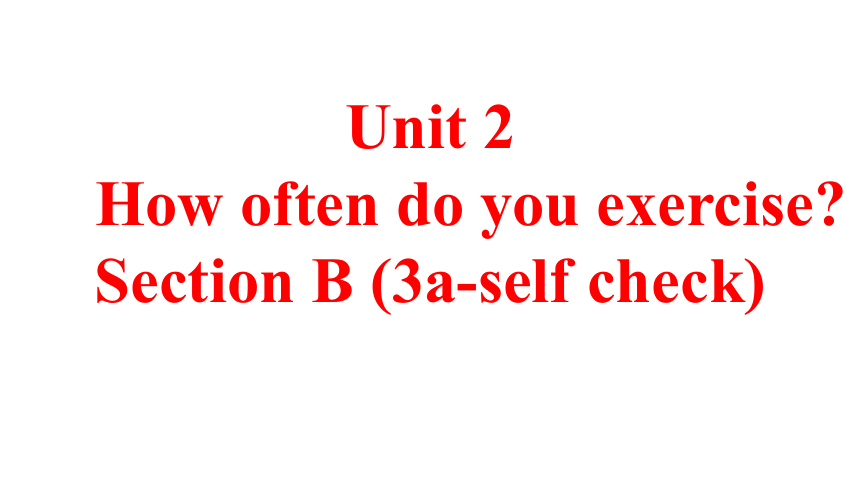 | |
| 格式 | zip | ||
| 文件大小 | 5.5MB | ||
| 资源类型 | 教案 | ||
| 版本资源 | 人教新目标(Go for it)版 | ||
| 科目 | 英语 | ||
| 更新时间 | 2021-09-16 23:50:16 | ||
图片预览

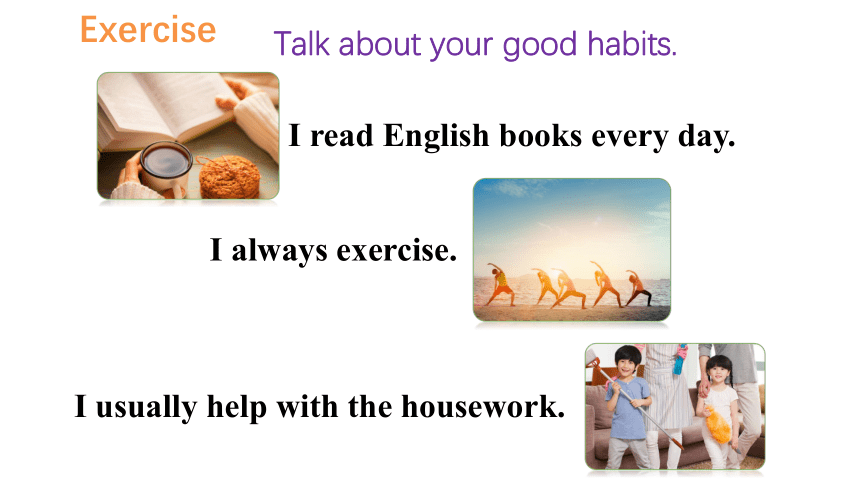
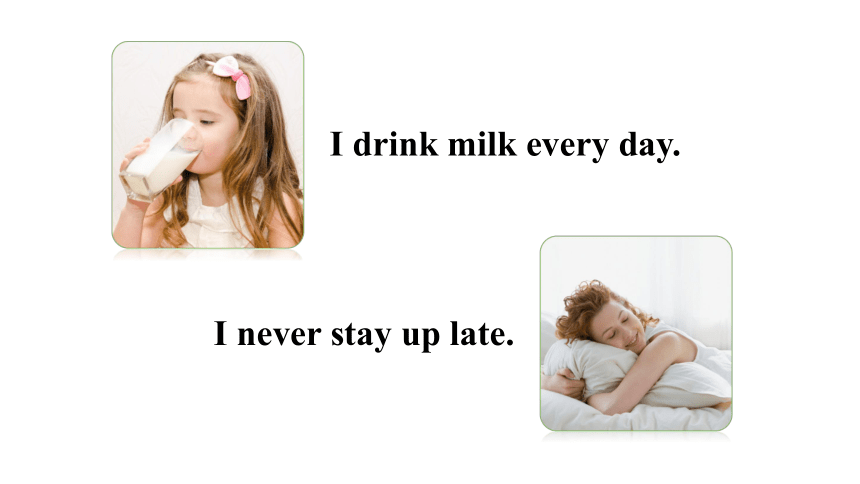
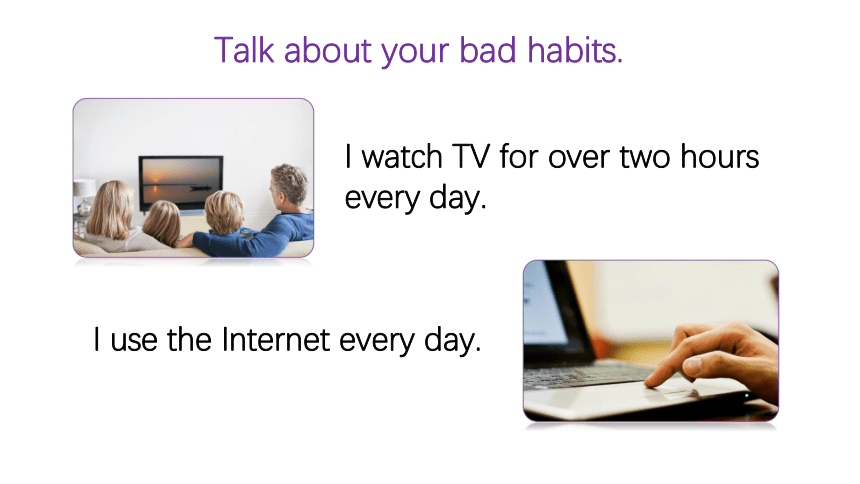
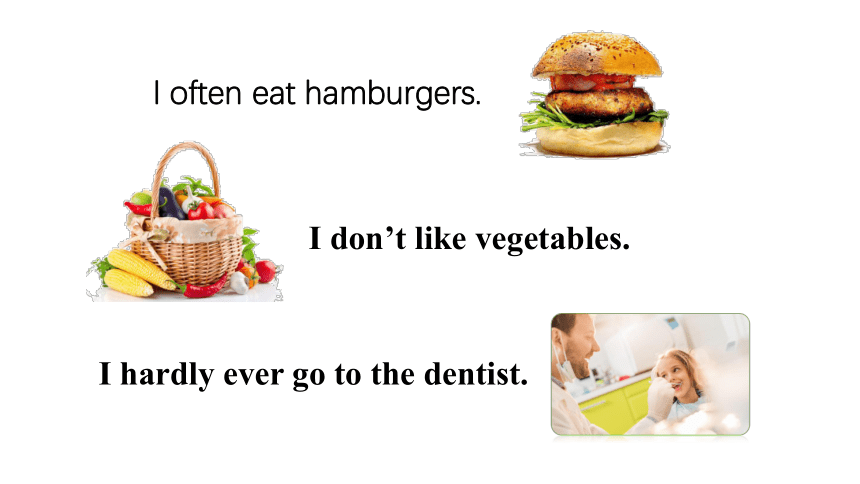
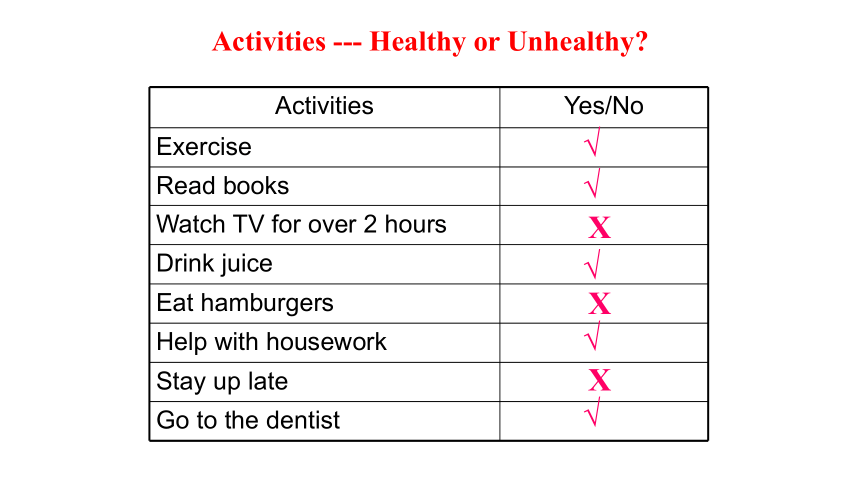

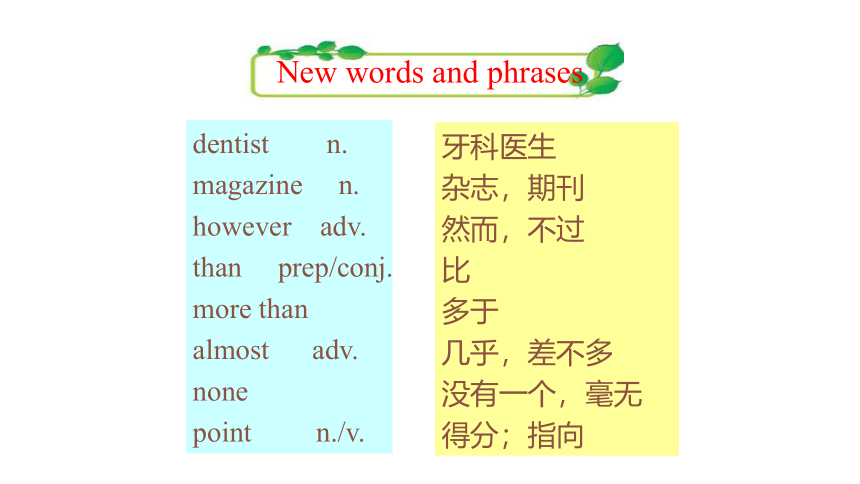
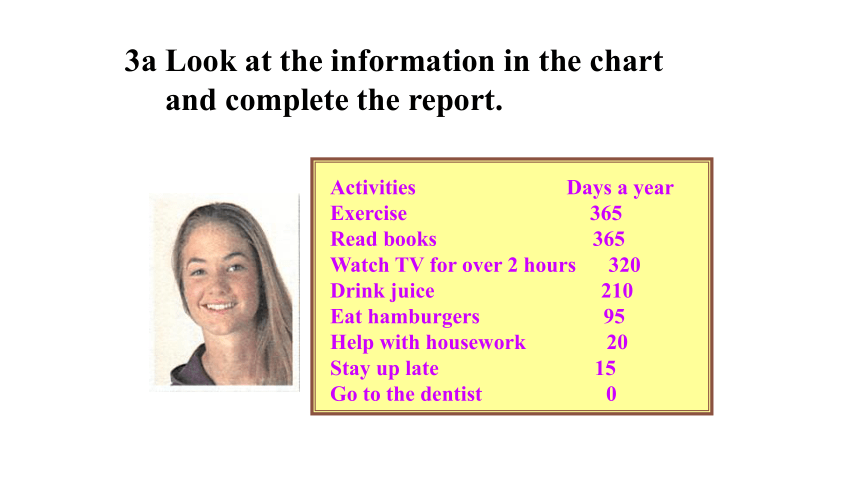
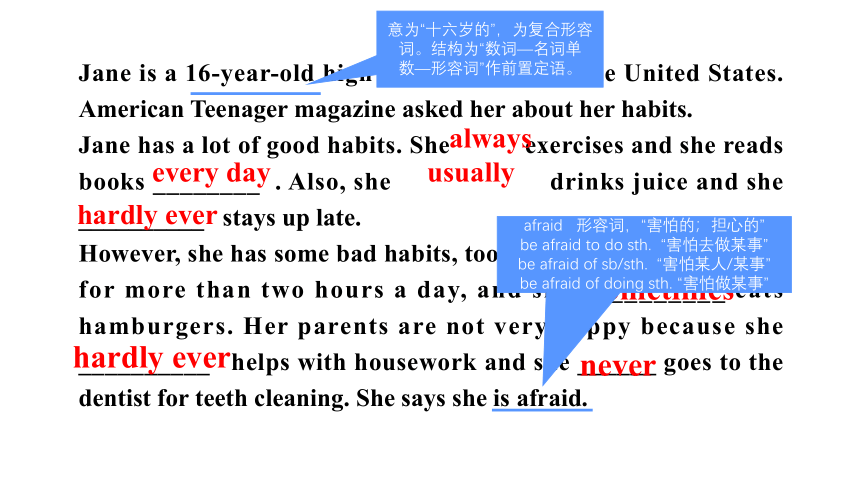
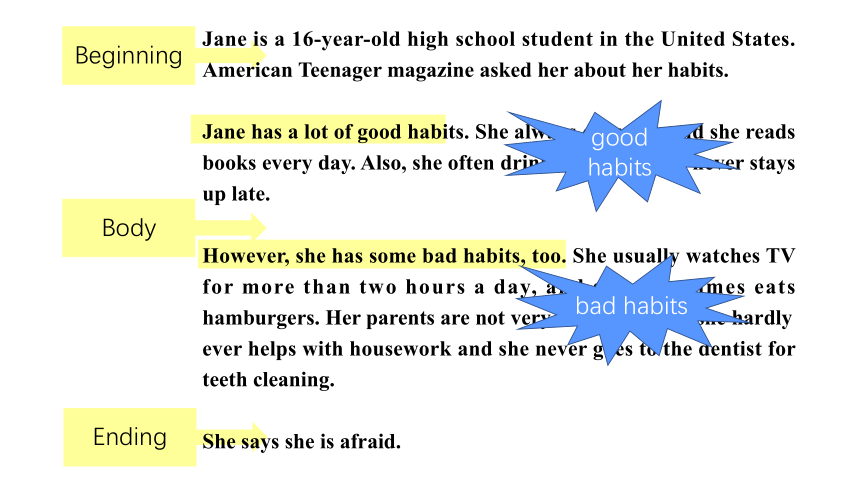
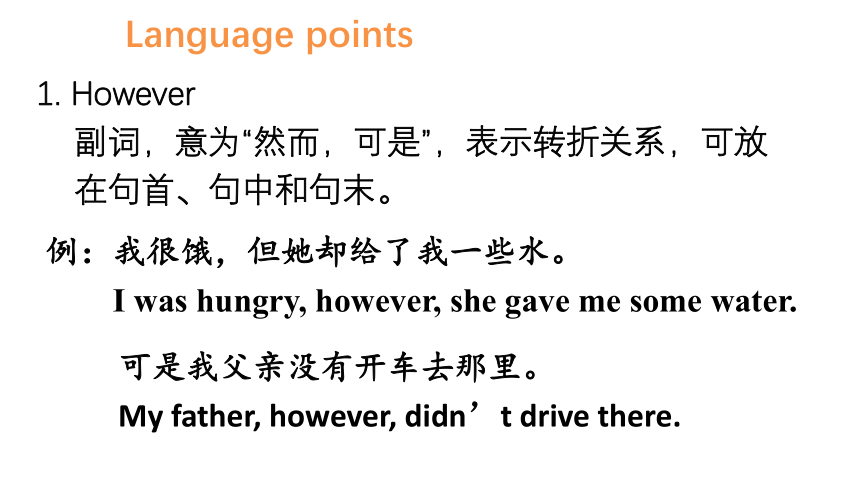
文档简介
(共32张PPT)
Unit
2
How
often
do
you
exercise?
Section
B
(3a-self
check)
Talk
about
your
good
habits.
I
read
English
books
every
day.
I
always
exercise.
I
usually
help
with
the
housework.
Exercise
I
drink
milk
every
day.
I
never
stay
up
late.
Talk
about
your
bad
habits.
I
use
the
Internet
every
day.
I
watch
TV
for
over
two
hours
every
day.
I
hardly
ever
go
to
the
dentist.
I
don’t
like
vegetables.
I
often
eat
hamburgers.
Activities
---
Healthy
or
Unhealthy?
Activities
Yes/No
Exercise
Read
books
Watch
TV
for
over
2
hours
Drink
juice
Eat
hamburgers
Help
with
housework
Stay
up
late
Go
to
the
dentist
√
√
X
√
X
√
X
√
找出相应的频率副词
Days
a
year
频率副词
365
365
320
210
95
20
15
0
always
everyday
usually
often
sometimes
seldom
hardly
ever
never
New
words
and
phrases
dentist
n.
magazine
n.
however
adv.
than
prep/conj.
more
than
almost
adv.
none
point
n./v.
牙科医生
杂志,期刊
然而,不过
比
多于
几乎,差不多
没有一个,毫无
得分;指向
3a
Look
at
the
information
in
the
chart
and
complete
the
report.
Activities
Days
a
year
Exercise
365
Read
books
365
Watch
TV
for
over
2
hours
320
Drink
juice
210
Eat
hamburgers
95
Help
with
housework
20
Stay
up
late
15
Go
to
the
dentist
0
Jane
is
a
16-year-old
high
school
student
in
the
United
States.
American
Teenager
magazine
asked
her
about
her
habits.
Jane
has
a
lot
of
good
habits.
She
exercises
and
she
reads
books
________
.
Also,
she
drinks
juice
and
she
__________
stays
up
late.
However,
she
has
some
bad
habits,
too.
She
_______
watches
TV
for
more
than
two
hours
a
day,
and
she
__________
eats
hamburgers.
Her
parents
are
not
very
happy
because
she
__________
helps
with
housework
and
she
______
goes
to
the
dentist
for
teeth
cleaning.
She
says
she
is
afraid.
always
hardly
ever
every
day
usually
always
sometimes
never
hardly
ever
意为“十六岁的”,为复合形容词。结构为“数词—名词单数—形容词”作前置定语。
afraid
形容词,“害怕的;担心的”
be
afraid
to
do
sth.
“害怕去做某事”
be
afraid
of
sb/sth.
“害怕某人/某事”
be
afraid
of
doing
sth.
“害怕做某事”
Ending
Beginning
Jane
is
a
16-year-old
high
school
student
in
the
United
States.
American
Teenager
magazine
asked
her
about
her
habits.
Jane
has
a
lot
of
good
habits.
She
always
exercises
and
she
reads
books
every
day.
Also,
she
often
drinks
juice
and
she
never
stays
up
late.
However,
she
has
some
bad
habits,
too.
She
usually
watches
TV
for
more
than
two
hours
a
day,
and
she
sometimes
eats
hamburgers.
Her
parents
are
not
very
happy
because
she
hardly
ever
helps
with
housework
and
she
never
goes
to
the
dentist
for
teeth
cleaning.
She
says
she
is
afraid.
Body
good
habits
bad
habits
1.
However
副词,意为“然而,可是”,表示转折关系,可放
在句首、句中和句末。
Language
points
例:我很饿,但她却给了我一些水。
I
was
hungry,
however,
she
gave
me
some
water.
可是我父亲没有开车去那里。
My
father,
however,
didn’t
drive
there.
2.
more
than
意为“多于”,相当于over
;
其反义词为less
than
,意为“少于”
。
例:回家用时从未超过一个小时。
It
never
takes
more
than/over
an
hour
to
go
home.
他们会在那里呆不到三天。
They’ll
stay
there
for
less
than
three
days.
3b
Complete
the
chart
with
your
own
information.
In
the
last
column,
use
expressions
like
always,
every
day,
twice
a
week
and
never.
Habits
Activities
How
often
Good
habits
Exercise
Read
books
Eat
fruit
Drink
milk
Stay
up
late
every
day
always
twice
a
week
every
day
never
Habits
Activities
How
often
Bad
habits
Watch
TV
for
over
2
hours
Use
the
Internet
Eat
hamburgers
Help
with
housework
Go
to
the
dentist
always
often
twice
a
week
hardly
ever
never
____________________________________________________________________________________________________________________________________________________________________________________________________________________________________________________________
______________________________________________________________________________________________________________________________
Write
a
report
about
your
good
and
bad
habits.
Say
how
often
you
do
things.
Use
the
report
in
3a
as
an
example.
4.Take
the
health
quiz.
1.How
often
do
you
eat
breakfast?
a.
Never.
b.
A
few
times
a
week.
c.
Almost
every
day.
2.How
often
do
you
eat
fast
food?
a.
Never.
b.
A
few
times
a
week.
c.
Almost
every
day.
3.How
often
do
you
eat
vegetables
and
fruit?
a.
Never.
b.
A
few
times
a
week.
c.
Almost
every
day.
4.How
often
do
you
exercise?
a.
A
few
times
a
year.
b.
A
few
times
a
month.
c.A
few
times
a
week.
5.How
many
hours
do
you
watch
TV
every
week?
a.
None.
b.
One
to
four.
c.
Five
or
more.
6.How
many
hours
do
you
usually
sleep
at
night?
a.
Less
than
six.
b.
Six
or
seven.
c.
Eight
or
more.
1.a=0,
b=1,c=2
2.a=2,
b=1,c=0
3.a=0,
b=1,c=2
4.a=0,
b=1,c=2
5.a=2,
b=1,c=0
6.a=0,
b=1,c=2
9-12
points:
You’re
really
healthy!
Good
for
you--and
your
health!
4-8
points:
You’re
smart
about
health
most
of
the
time.
0-3
points:
You
have
to
learn
more
about
healthy
habits.
Don’t
worry--you
can
do
it!
Are
you
healthy?
1.
Complete
the
chart
with
activities
you
do
and
don’t
do.
What
about
your
mother/
father?
always
usually
often
sometimes
hardly
ever
never
I
My
mother
or
father
Self
check
I
My
mother/father
always
usually
often
sometimes
hardly
ever
never
play
basketball
play
chess
read
books
read
newspapers
eat
hamburgers
eat
chicken
drink
juice
drink
tea
watch
TV
use
the
Internet
stay
up
late
get
up
early
Example
2.
Write
five
sentences
using
the
information
above.
5.
I
hardly
ever
watch
TV.
1.
I
always
play
basketball
after
school.
2.
My
father
always
plays
chess
on
weekends.
3.
I
usually
read
books
on
weekends.
4.
My
father
sometimes
drinks
tea.
6.
My
father
never
gets
up
early.
A:
What
do
Tom
and
Mike
__________
do
on
weekends?
B:
They
sometimes
go
to
the
museum.
A:
___________
do
they
go
to
the
shopping
center?
B:
_________
ever.
Maybe
about
twice
a
month.
usually
How
often
Hardly
3.
Fill
in
the
blanks
in
the
conversation.
A:
_________
do
they
watch
TV?
B:
Mike
never
watches
TV,
but
Tom
watches
TV
_________________
a
day.
A:
Oh,
I’m
just
like
Tom.
I
________
watch
TV,
too.
How
often
over
two
hours
never
一、根据内容,?选择恰当单词或短语填空。
although,
coffee,
such,
at
least,
almost,
hardly
ever,
go
online,
however
Hi,
I'm
Claire.
I
often
(1)__________
to
read
some
stories.
Last
week
I
read
(2)_______
an
interesting
story.
There's
an
old
man
called
Joe.
go
online
such
Exercise
although,
coffee,
such,
at
least,
almost,
hardly
ever,
go
online,
however
(3)___________
he's
not
rich,
he
is
fun.
As
a
backpacker
(背包客),
Joe
visited
many
interesting
places?—?(4)____________
eighteen
countries.
One
day
he
had
an
idea.
Why
not
make
a
house
under
the
ground?
He
told
his
family
about
it.
(5)_________
all
his
family
members
thought
he
was
crazy
(疯狂的).
Although
at
least
Almost
although,
coffee,
such,
at
least,
almost,
hardly
ever,
go
online,
however
(6)__________,
Joe
started
to
work
by
himself.
His
family
(7)_______________
helped
him.
Twelve
years
later,
his
house
was
OK.
Joe's
house
has
three
bedrooms,
a
living
room
and
a
bathroom.
Joe
often
plays
cards
or
drinks
(8)________
with
his
family
in
his
living
room.
However
hardly
ever
coffee
1.
We
______
go
out
to
eat
but
not
very
often.
A.
usually
B.
always
C.
never
D.
sometimes
2.
—
________
do
you
read
English?
—
Every
evening.
A.
How
long
B.
How
often
C.
How
far
D.
How
much
二、单项选择。
3.
Maria
likes
______
every
morning.
A.
running
B.
ran
C.
runs
D.
run
4.
My
sister
likes
fruit
_______
she
doesn’t
like
vegetables.
A.
and
B.
but
C.
or
D.
also
5.
—_____
do
you
eat
junk
food?—About
once
a
week.
A.
How
B.
How
many
C.
How
long
D.
How
often
5.
—_____
do
you
eat
junk
food?—About
once
a
week.
A.
How
B.
How
many
C.
How
long
D.
How
often
二、连词成句。
how,
do,
computer,
often,
play,
you,
games
2.
how,
movies,
does,
Jim,
often,
go,
to
How
often
do
you
play
computer
games?
How
often
does
Jim
go
to
movies?
3.
do,
twice,
watch,
you,
TV,
a
week
4.
most,
three,
or,
a,
week,
exercise,
students,
times,
four
5.
favorite,
is,
what,
program,
your
Do
you
watch
TV
twice
a
week?
Most
students
exercise
three
or
four
times
a
week.
What
is
your
favorite
program?
Unit
2
How
often
do
you
exercise?
Section
B
(3a-self
check)
Talk
about
your
good
habits.
I
read
English
books
every
day.
I
always
exercise.
I
usually
help
with
the
housework.
Exercise
I
drink
milk
every
day.
I
never
stay
up
late.
Talk
about
your
bad
habits.
I
use
the
Internet
every
day.
I
watch
TV
for
over
two
hours
every
day.
I
hardly
ever
go
to
the
dentist.
I
don’t
like
vegetables.
I
often
eat
hamburgers.
Activities
---
Healthy
or
Unhealthy?
Activities
Yes/No
Exercise
Read
books
Watch
TV
for
over
2
hours
Drink
juice
Eat
hamburgers
Help
with
housework
Stay
up
late
Go
to
the
dentist
√
√
X
√
X
√
X
√
找出相应的频率副词
Days
a
year
频率副词
365
365
320
210
95
20
15
0
always
everyday
usually
often
sometimes
seldom
hardly
ever
never
New
words
and
phrases
dentist
n.
magazine
n.
however
adv.
than
prep/conj.
more
than
almost
adv.
none
point
n./v.
牙科医生
杂志,期刊
然而,不过
比
多于
几乎,差不多
没有一个,毫无
得分;指向
3a
Look
at
the
information
in
the
chart
and
complete
the
report.
Activities
Days
a
year
Exercise
365
Read
books
365
Watch
TV
for
over
2
hours
320
Drink
juice
210
Eat
hamburgers
95
Help
with
housework
20
Stay
up
late
15
Go
to
the
dentist
0
Jane
is
a
16-year-old
high
school
student
in
the
United
States.
American
Teenager
magazine
asked
her
about
her
habits.
Jane
has
a
lot
of
good
habits.
She
exercises
and
she
reads
books
________
.
Also,
she
drinks
juice
and
she
__________
stays
up
late.
However,
she
has
some
bad
habits,
too.
She
_______
watches
TV
for
more
than
two
hours
a
day,
and
she
__________
eats
hamburgers.
Her
parents
are
not
very
happy
because
she
__________
helps
with
housework
and
she
______
goes
to
the
dentist
for
teeth
cleaning.
She
says
she
is
afraid.
always
hardly
ever
every
day
usually
always
sometimes
never
hardly
ever
意为“十六岁的”,为复合形容词。结构为“数词—名词单数—形容词”作前置定语。
afraid
形容词,“害怕的;担心的”
be
afraid
to
do
sth.
“害怕去做某事”
be
afraid
of
sb/sth.
“害怕某人/某事”
be
afraid
of
doing
sth.
“害怕做某事”
Ending
Beginning
Jane
is
a
16-year-old
high
school
student
in
the
United
States.
American
Teenager
magazine
asked
her
about
her
habits.
Jane
has
a
lot
of
good
habits.
She
always
exercises
and
she
reads
books
every
day.
Also,
she
often
drinks
juice
and
she
never
stays
up
late.
However,
she
has
some
bad
habits,
too.
She
usually
watches
TV
for
more
than
two
hours
a
day,
and
she
sometimes
eats
hamburgers.
Her
parents
are
not
very
happy
because
she
hardly
ever
helps
with
housework
and
she
never
goes
to
the
dentist
for
teeth
cleaning.
She
says
she
is
afraid.
Body
good
habits
bad
habits
1.
However
副词,意为“然而,可是”,表示转折关系,可放
在句首、句中和句末。
Language
points
例:我很饿,但她却给了我一些水。
I
was
hungry,
however,
she
gave
me
some
water.
可是我父亲没有开车去那里。
My
father,
however,
didn’t
drive
there.
2.
more
than
意为“多于”,相当于over
;
其反义词为less
than
,意为“少于”
。
例:回家用时从未超过一个小时。
It
never
takes
more
than/over
an
hour
to
go
home.
他们会在那里呆不到三天。
They’ll
stay
there
for
less
than
three
days.
3b
Complete
the
chart
with
your
own
information.
In
the
last
column,
use
expressions
like
always,
every
day,
twice
a
week
and
never.
Habits
Activities
How
often
Good
habits
Exercise
Read
books
Eat
fruit
Drink
milk
Stay
up
late
every
day
always
twice
a
week
every
day
never
Habits
Activities
How
often
Bad
habits
Watch
TV
for
over
2
hours
Use
the
Internet
Eat
hamburgers
Help
with
housework
Go
to
the
dentist
always
often
twice
a
week
hardly
ever
never
____________________________________________________________________________________________________________________________________________________________________________________________________________________________________________________________
______________________________________________________________________________________________________________________________
Write
a
report
about
your
good
and
bad
habits.
Say
how
often
you
do
things.
Use
the
report
in
3a
as
an
example.
4.Take
the
health
quiz.
1.How
often
do
you
eat
breakfast?
a.
Never.
b.
A
few
times
a
week.
c.
Almost
every
day.
2.How
often
do
you
eat
fast
food?
a.
Never.
b.
A
few
times
a
week.
c.
Almost
every
day.
3.How
often
do
you
eat
vegetables
and
fruit?
a.
Never.
b.
A
few
times
a
week.
c.
Almost
every
day.
4.How
often
do
you
exercise?
a.
A
few
times
a
year.
b.
A
few
times
a
month.
c.A
few
times
a
week.
5.How
many
hours
do
you
watch
TV
every
week?
a.
None.
b.
One
to
four.
c.
Five
or
more.
6.How
many
hours
do
you
usually
sleep
at
night?
a.
Less
than
six.
b.
Six
or
seven.
c.
Eight
or
more.
1.a=0,
b=1,c=2
2.a=2,
b=1,c=0
3.a=0,
b=1,c=2
4.a=0,
b=1,c=2
5.a=2,
b=1,c=0
6.a=0,
b=1,c=2
9-12
points:
You’re
really
healthy!
Good
for
you--and
your
health!
4-8
points:
You’re
smart
about
health
most
of
the
time.
0-3
points:
You
have
to
learn
more
about
healthy
habits.
Don’t
worry--you
can
do
it!
Are
you
healthy?
1.
Complete
the
chart
with
activities
you
do
and
don’t
do.
What
about
your
mother/
father?
always
usually
often
sometimes
hardly
ever
never
I
My
mother
or
father
Self
check
I
My
mother/father
always
usually
often
sometimes
hardly
ever
never
play
basketball
play
chess
read
books
read
newspapers
eat
hamburgers
eat
chicken
drink
juice
drink
tea
watch
TV
use
the
Internet
stay
up
late
get
up
early
Example
2.
Write
five
sentences
using
the
information
above.
5.
I
hardly
ever
watch
TV.
1.
I
always
play
basketball
after
school.
2.
My
father
always
plays
chess
on
weekends.
3.
I
usually
read
books
on
weekends.
4.
My
father
sometimes
drinks
tea.
6.
My
father
never
gets
up
early.
A:
What
do
Tom
and
Mike
__________
do
on
weekends?
B:
They
sometimes
go
to
the
museum.
A:
___________
do
they
go
to
the
shopping
center?
B:
_________
ever.
Maybe
about
twice
a
month.
usually
How
often
Hardly
3.
Fill
in
the
blanks
in
the
conversation.
A:
_________
do
they
watch
TV?
B:
Mike
never
watches
TV,
but
Tom
watches
TV
_________________
a
day.
A:
Oh,
I’m
just
like
Tom.
I
________
watch
TV,
too.
How
often
over
two
hours
never
一、根据内容,?选择恰当单词或短语填空。
although,
coffee,
such,
at
least,
almost,
hardly
ever,
go
online,
however
Hi,
I'm
Claire.
I
often
(1)__________
to
read
some
stories.
Last
week
I
read
(2)_______
an
interesting
story.
There's
an
old
man
called
Joe.
go
online
such
Exercise
although,
coffee,
such,
at
least,
almost,
hardly
ever,
go
online,
however
(3)___________
he's
not
rich,
he
is
fun.
As
a
backpacker
(背包客),
Joe
visited
many
interesting
places?—?(4)____________
eighteen
countries.
One
day
he
had
an
idea.
Why
not
make
a
house
under
the
ground?
He
told
his
family
about
it.
(5)_________
all
his
family
members
thought
he
was
crazy
(疯狂的).
Although
at
least
Almost
although,
coffee,
such,
at
least,
almost,
hardly
ever,
go
online,
however
(6)__________,
Joe
started
to
work
by
himself.
His
family
(7)_______________
helped
him.
Twelve
years
later,
his
house
was
OK.
Joe's
house
has
three
bedrooms,
a
living
room
and
a
bathroom.
Joe
often
plays
cards
or
drinks
(8)________
with
his
family
in
his
living
room.
However
hardly
ever
coffee
1.
We
______
go
out
to
eat
but
not
very
often.
A.
usually
B.
always
C.
never
D.
sometimes
2.
—
________
do
you
read
English?
—
Every
evening.
A.
How
long
B.
How
often
C.
How
far
D.
How
much
二、单项选择。
3.
Maria
likes
______
every
morning.
A.
running
B.
ran
C.
runs
D.
run
4.
My
sister
likes
fruit
_______
she
doesn’t
like
vegetables.
A.
and
B.
but
C.
or
D.
also
5.
—_____
do
you
eat
junk
food?—About
once
a
week.
A.
How
B.
How
many
C.
How
long
D.
How
often
5.
—_____
do
you
eat
junk
food?—About
once
a
week.
A.
How
B.
How
many
C.
How
long
D.
How
often
二、连词成句。
how,
do,
computer,
often,
play,
you,
games
2.
how,
movies,
does,
Jim,
often,
go,
to
How
often
do
you
play
computer
games?
How
often
does
Jim
go
to
movies?
3.
do,
twice,
watch,
you,
TV,
a
week
4.
most,
three,
or,
a,
week,
exercise,
students,
times,
four
5.
favorite,
is,
what,
program,
your
Do
you
watch
TV
twice
a
week?
Most
students
exercise
three
or
four
times
a
week.
What
is
your
favorite
program?
同课章节目录
- Unit 1 Where did you go on vacation?
- Section A
- Section B
- Unit 2 How often do you exercise?
- Section A
- Section B
- Unit 3 I'm more outgoing than my sister.
- Section A
- Section B
- Unit 4 What's the best movie theater?
- Section A
- Section B
- Unit 5 Do you want to watch a game show?
- Section A
- Section B
- Unit 6 I'm going to study computer science.
- Section A
- Section B
- Unit 7 Will people have robots?
- Section A
- Section B
- Unit 8 How do you make a banana milk shake?
- Section A
- Section B
- Unit 9 Can you come to my party?
- Section A
- Section B
- Unit 10 If you go to the party, you'll have a grea
- Section A
- Section B
